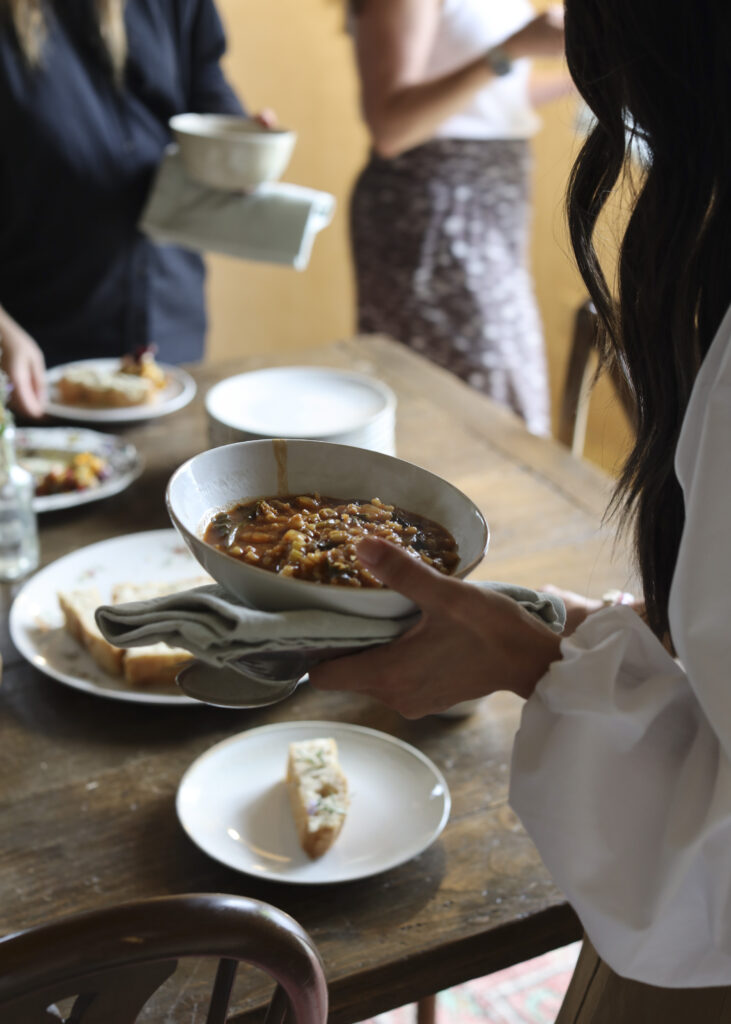The holiday season can be both exciting and challenging, especially for those in recovery from alcohol or substance misuse. While it’s a time to celebrate with friends and family, it’s also a time when alcohol is often present at nearly every gathering. For those who have worked hard to maintain their sobriety, navigating the temptation and pressure to drink during the holidays can feel overwhelming. However, with the right strategies, it’s absolutely possible to set clear boundaries around alcohol and enjoy the season while protecting your sobriety. If your loved-one is in recovery, this advice can work for you, too!

1. Reflect on Your Priorities Before the Holidays Begin
The first step in setting boundaries is to reflect on what’s most important to you during the holidays. What are your goals for the season? Are you focused on family, spirituality, rest, or simply enjoying time with loved ones? When you identify your priorities, it becomes easier to stay focused on your recovery and avoid situations that might challenge your sobriety.
Tip: Take some time before the season kicks off to write down your goals and remind yourself that your well-being comes first. This can be a helpful anchor when navigating social events.
2. Plan Ahead and Set Clear Boundaries around Alcohol
Planning is essential to creating healthy boundaries. Before heading to a holiday party, family gathering, or any event where alcohol will be served, decide in advance how you will handle the situation. Do you need to avoid these scenarios altogether, or set a specific limit for yourself? Do you need to bring your own non-alcoholic drink to stay comfortable?
Having a plan in place removes the pressure of making last-minute decisions in potentially tempting situations. It also gives you the confidence to stick to your goals.
Tip: If you’re unsure about how to navigate a specific event, think through potential scenarios and come up with responses ahead of time. For example, you could plan to say, “I’m not drinking tonight, but thank you for offering,” or “I’m taking a break from alcohol to focus on my health.”
3. Practice Saying “No” to Alcohol Firmly and Set Boundaries Without Guilt
One of the hardest parts of maintaining sobriety during the holidays for those in early recovery is dealing with social pressure. Friends or family members may offer you drinks or even question your decision not to drink. It’s crucial to remember that you are not obligated to explain your choices to anyone. You are entitled to set boundaries around alcohol that protect your sobriety and your serenity.
Tip: Practice saying “no” in a calm, confident way. You don’t need to justify or defend your decision—simply saying, “I’m not drinking tonight, but thanks for offering” can be enough. Having a go-to response prepared can make these moments easier.

4. Attend Events with a Support Person during the Holidays
Having a recovery buddy with you can make a big difference, especially in environments where alcohol is prevalent. A fellow sober friend, sponsor, or family member who understands your journey can provide moral support, keep you grounded, and help you resist the temptation to drink. Additionally, they can be a comforting reminder that you are not alone in your commitment to sobriety.
Tip: Plan to attend events with someone who shares your recovery goals or someone who is sober. Having someone who understands your boundaries can offer reassurance and help keep you accountable.
5. Bring Your Own Non-Alcoholic Drink
When alcohol is everywhere, it can sometimes feel awkward not having a drink in hand. To avoid feeling out of place, bring your own non-alcoholic beverage. Whether it’s sparkling water, soda, or a festive mocktail, having a drink in your hand can help you avoid unwanted questions and distractions. Plus, you won’t have to rely on others to provide non-alcoholic options.
6. Avoid High-Risk Situations
While the holiday season is filled with opportunities to celebrate, some events or situations may pose higher risks for relapse or temptation. If you know that certain gatherings or settings are triggering for you—such as parties with heavy drinking or a stressful family dynamic—it’s okay to skip them or leave early. Protecting your sobriety is always more important than attending every social event.
Tip: Create an exit strategy. If you decide to attend an event but start feeling uncomfortable, have an exit plan in place. For example, you might tell yourself that you’ll leave after an hour, or you could arrange a ride with a friend so you have a reason to leave early if needed.
7. Focus on the Non-Alcoholic Aspects of the Holiday Season
The holidays are about more than just drinking—they’re about family, tradition, giving, and making memories. Focus on the aspects of the season that bring you joy and fulfillment, such as spending quality time with loved ones, participating in holiday activities, and engaging in meaningful conversations. By shifting your attention away from alcohol, you’ll be able to enjoy the true spirit of the season.
Tip: Create new traditions that don’t revolve around drinking. Whether it’s volunteering, organizing a family game night, or taking a winter walk, these activities can become the highlight of your holiday season.
8. Develop a Healthy Support Network
Having a support system in place is one of the best ways to stay strong in your recovery during the holidays. Whether it’s through 12-step meetings, therapy, or talking to a sponsor, staying connected with people who understand your journey can provide emotional support when you need it most. They can remind you of your goals, share their experiences, and offer encouragement.
Tip: Attend meetings or check in with a support group during the holidays. Many groups have special holiday meetings or virtual check-ins, making it easier to stay connected with your recovery community.

9. Have a Sobriety Affirmation or Mantra Ready
In moments of temptation, having an affirmation or mantra to repeat to yourself can help you refocus and stay committed to your recovery. It can be something simple like, “I am stronger than my urges,” or “My sobriety is worth the effort.” These reminders can help you shift your mindset when you’re feeling vulnerable.
Tip: Write down your affirmation on a card or in your phone so that you can easily access it when you need encouragement.
10. Be Kind to Yourself
Lastly, remember that recovery is a journey, and it’s okay to have moments of difficulty. If you find yourself struggling during the holiday season, practice self-compassion. Remind yourself that you are doing the best you can, and that every day sober is an accomplishment. Don’t be too hard on yourself if things don’t go perfectly. What matters most is your commitment to your health and recovery.
The holidays can be a time of celebration, connection, and joy—but they can also pose challenges for those in recovery. By setting clear boundaries around alcohol, planning ahead, and surrounding yourself with supportive people, you can create a healthy environment where your sobriety is respected and protected. Remember, you don’t have to sacrifice your well-being to enjoy the holiday season. With mindfulness and preparation, you can celebrate with confidence and stay true to the progress you’ve made in your recovery journey.
Wishing you a peaceful, joyful, and sober holiday season!

If you or your loved one is struggling with alcoholism or another form of addiction, please visit our services page to learn about our process and ways we can work together. We offer complimentary consultations to answer any questions you may have about the intervention process and recovery.